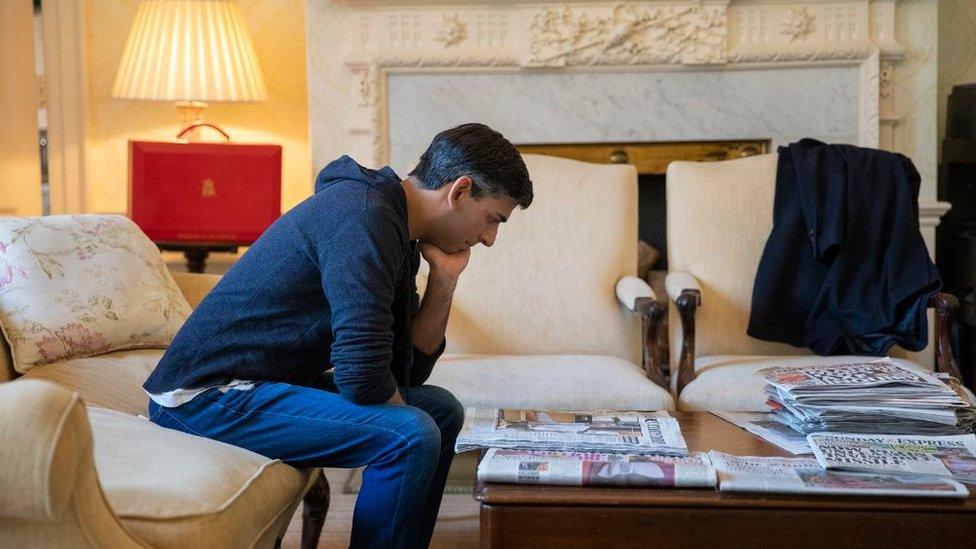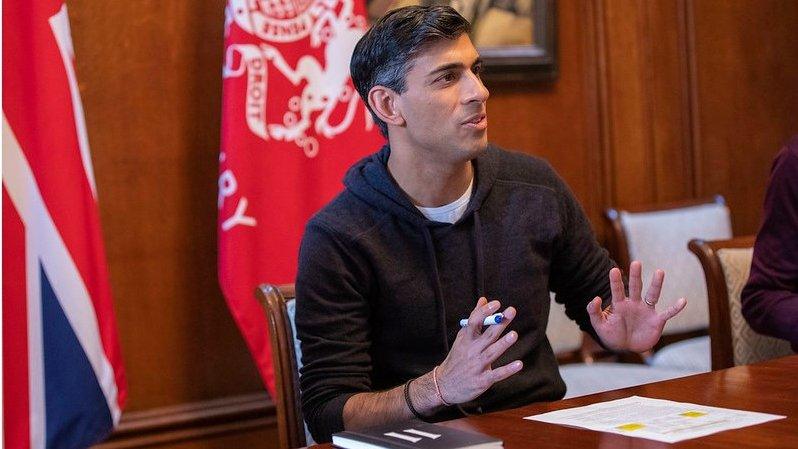Spring Statement: Will Rishi Sunak help where it really hurts?
- Published

The final preparation is done. The photographs of the chancellor getting ready have been released.
In one, life imitating political art at least, Rishi Sunak appears to be gazing at an interview and picture of himself - one of the previews of his big day.
Expectation has been more muted than normal - given the horror of events in Ukraine - but the Spring Statement is still a significant event that matters for all of us.
The decisions he announces at the dispatch box will affect the prices we pay, the pound in our pocket.
Before the conflict, there was already a squeeze on everyone's wallet coming. Since the outbreak, day by day, the uncertainty around the economy, and the impact of what's unfolding, has only become more acute.
As the chancellor practised a final run through of the speech on Tuesday evening, with aides and pizza, his intention was not to reveal a massive financial package to meet this moment.
If the size of his dinner matches the scale of the spending, the opposition will be disappointed - he only had one slice.
The big decisions were, in the main, taken several weeks ago.
Don't roll the drums for big financial drama at lunchtime. Despite lots of chatter about increasing defence spending, for example, I'm told there wasn't actually a formal request from the Ministry of Defence for any extra funding.
Although every day brings new calls for more help with rocketing energy bills, the Treasury has been reluctant to move from the extra support they promised already, which was only announced last month.
That's in part because the Treasury is instinctively cautious with cash. But also because price rises are so hard to predict and may go on for many, many months.
The caution will also come because it is a matter of political choice.
For Mr Sunak, Wednesday's speech is also a continuation of a path he set out in the autumn Budget.
He talked then, in what was an echo of Margaret Thatcher, about the limitations of government, saying: "There's a reason we talk about the importance of family, community, and personal responsibility.
"Not because these are an alternative to the market or the state… it's because they are more important than the market or the state.
"The moments that make life worth living aren't created by government, aren't announced by government, aren't granted by government."
It was a message to his party that despite presiding over months of mammoth spending during the pandemic, he was reluctant to splurge.
It was a message to his next door neighbour too, that No 11 wouldn't release the purse strings to pay for all of No 10's political desires.
And it was a message to the country that the government's money man was serious about trying to get the books under control.
The headlines of Rishi Sunak's Budget last October
There was a contradiction then, in October, because the man who was standing at the despatch box arguing the case for small government was a tax raising, billions spending, big borrowing chancellor.
His justification for his temporary political personality transplant was, of course, the pandemic, an emergency that called for it.
He wanted to draw a line under that period, and call the end of that economic emergency.
But even before the war in Ukraine, many families and firms faced different financial emergencies of their own. And that situation seems only likely to get worse.
Of course, the details of the statement in black and white will be what matters on Wednesday lunchtime, more important than any of the warm up in advance.
Every chancellor likes to keep something under wraps, and there could of course yet be a big surprise.
Yet there's a risk that Rishi Sunak could be accused of creating another contradiction - a chancellor that is at pains to say he wants to help with the cost of living however he can, but won't act boldly enough to help people when it really hurts.
You'll be able to follow everything that's announced and what it means for you on the BBC News channel, website and our Twitter feed @BBCPolitics, external.
- Published23 March 2022

